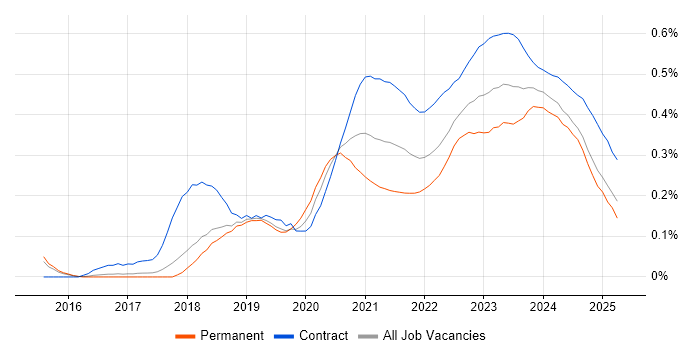YAML
UK > Work from Home
The table below provides summary statistics for permanent remote or hybrid work requiring YAML skills. It includes a benchmarking guide to the annual salaries offered in vacancies that cited YAML over the 6 months leading up to 15 May 2025, comparing them to the same period in the previous two years.
| 6 months to 15 May 2025 |
Same period 2024 | Same period 2023 | |
|---|---|---|---|
| Rank | 429 | 462 | 519 |
| Rank change year-on-year | +33 | +57 | +215 |
| Permanent jobs citing YAML | 24 | 126 | 143 |
| As % of all permanent jobs with a WFH option | 0.13% | 0.37% | 0.35% |
| As % of the Libraries, Frameworks & Software Standards category | 0.47% | 1.40% | 1.03% |
| Number of salaries quoted | 22 | 61 | 104 |
| 10th Percentile | £47,550 | £56,250 | £43,750 |
| 25th Percentile | £50,313 | £67,500 | £53,750 |
| Median annual salary (50th Percentile) | £66,500 | £77,500 | £69,447 |
| Median % change year-on-year | -14.19% | +11.60% | -4.21% |
| 75th Percentile | £85,625 | £85,000 | £77,715 |
| 90th Percentile | £98,625 | £115,000 | £90,875 |
| UK median annual salary | £70,500 | £75,000 | £69,447 |
| % change year-on-year | -6.00% | +8.00% | -0.79% |
All Software Libraries and Frameworks
Work from Home
YAML falls under the Software Libraries and Frameworks category. For comparison with the information above, the following table provides summary statistics for all permanent job vacancies with remote or hybrid options requiring technical specification, industry standards, software libraries and framework skills.
| Permanent vacancies with a requirement for technical specification, industry standards, software libraries and framework skills | 5,100 | 8,994 | 13,891 |
| As % of all permanent jobs with a WFH option | 28.29% | 26.71% | 33.91% |
| Number of salaries quoted | 3,043 | 7,519 | 10,442 |
| 10th Percentile | £39,000 | £38,750 | £41,250 |
| 25th Percentile | £51,250 | £47,500 | £51,104 |
| Median annual salary (50th Percentile) | £65,000 | £60,000 | £65,000 |
| Median % change year-on-year | +8.33% | -7.69% | +4.00% |
| 75th Percentile | £85,000 | £79,500 | £86,250 |
| 90th Percentile | £115,000 | £100,000 | £102,500 |
| UK median annual salary | £65,000 | £60,000 | £67,500 |
| % change year-on-year | +8.33% | -11.11% | +6.30% |
YAML
Trend for Jobs with a WFH Option
Job vacancies with remote working options citing YAML as a proportion of all IT jobs advertised.

YAML
Salary Trend for Jobs with a WFH Option
3-month moving average salary quoted in job vacancies with remote working options citing YAML.
YAML
Salary Histogram for Jobs with a WFH Option
Salary distribution for jobs with remote working options citing YAML over the 6 months to 15 May 2025.
YAML
Co-occurring Skills and Capabilities with WFH Options by Category
The follow tables expand on the table above by listing co-occurrences grouped by category. The same employment type, locality and period is covered with up to 20 co-occurrences shown in each of the following categories:
|
|
|||||||||||||||||||||||||||||||||||||||||||||||||||||||||||||||||||||||||||||||||||||||||||||||||||||||||||||||
|
|
|||||||||||||||||||||||||||||||||||||||||||||||||||||||||||||||||||||||||||||||||||||||||||||||||||||||||||||||
|
|
|||||||||||||||||||||||||||||||||||||||||||||||||||||||||||||||||||||||||||||||||||||||||||||||||||||||||||||||
|
|
|||||||||||||||||||||||||||||||||||||||||||||||||||||||||||||||||||||||||||||||||||||||||||||||||||||||||||||||
|
|
|||||||||||||||||||||||||||||||||||||||||||||||||||||||||||||||||||||||||||||||||||||||||||||||||||||||||||||||
|
|
|||||||||||||||||||||||||||||||||||||||||||||||||||||||||||||||||||||||||||||||||||||||||||||||||||||||||||||||
|
|
|||||||||||||||||||||||||||||||||||||||||||||||||||||||||||||||||||||||||||||||||||||||||||||||||||||||||||||||
|
|
|||||||||||||||||||||||||||||||||||||||||||||||||||||||||||||||||||||||||||||||||||||||||||||||||||||||||||||||
|
||||||||||||||||||||||||||||||||||||||||||||||||||||||||||||||||||||||||||||||||||||||||||||||||||||||||||||||||
